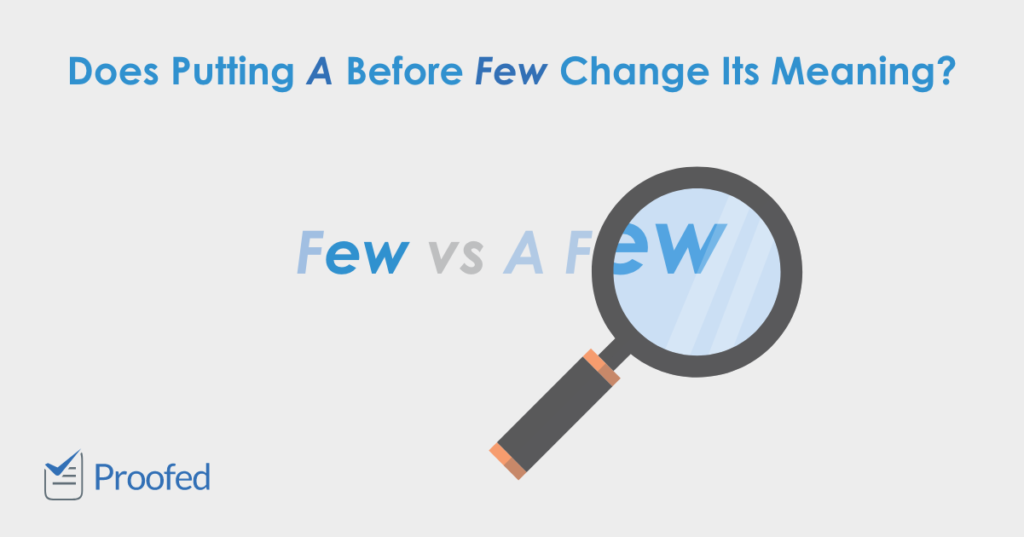In English, ‘few’ means ‘a small number of something’. Seems simple, yes? Unfortunately, the exact meaning of this word depends on how you use it:
- By itself, few means ‘not many’ or ‘hardly any’.
- When preceded by ‘a’, the phrase a few means ‘some’.
This is a subtle but important difference. The terms ‘little’ and ‘a little’ work in a similar way. So to find out how these words work in practice, and to make sure your writing is error free, check out our guide below.
Few (Not Many) vs. A Few (Some)
Typically, ‘few’ is a quantifier (i.e. it tells us how many or how much of something there is). In particular, we use this term with countable nouns to mean ‘not many’ of something. For example:
I’ve had few chances to travel. = I’ve not had many chances to travel.
But if we put ‘a’ in front, the meaning changes slightly to mean ‘some’:
I’ve had a few chances to travel. = I’ve had some chances to travel.
Both versions mean ‘a small number’, but the emphasis changes:
- When we say ‘few’, we’re focusing on the lack of chances to travel.
- When we say ‘a few’, we’re focusing on the small number of chances to travel the speaker has had, not the absence of further chances.
Here, then, we see how adding the ‘a’ shifts the focus of the sentence.
Little (Not Much) vs. A Little (A Small Amount)
Used as quantifiers, ‘little’ and ‘a little’ both mean ‘a small amount’, though the emphasis is different in each case. When used alone, ‘little’ means ‘not much’:
Find this useful?
Subscribe to our newsletter and get writing tips from our editors straight to your inbox.
I’ve given little thought to it. = I’ve not given much thought to it.
But when we say ‘a little’, we mean ‘some’ instead:
I’ve given a little thought to it. = I’ve given some thought to it.
As with ‘few’ and ‘a few’, then, the focus shifts when we add the indefinite article before the quantifier. The main difference is that we use ‘little’ and ‘a little’ with uncountable nouns rather than countable nouns.
Summary: When to Add ‘A’ Before Few or Little
Take care with the word ‘few’, as its meaning changes when you add an ‘a’:
- Few means ‘not many’ or ‘hardly any’ (e.g. There were few people he trusted with his secrets = There were hardly any people he trusted with his secrets).
- A few means ‘some’ or ‘a small number’ (e.g. He had a few people he trusted with his secrets = There were some people he trusted with his secrets).
We see something similar when using ‘little’ or ‘a little’ as a quantifier:
- Little means ‘not much’ or ‘hardly any’ (e.g. He had little money left to spend = He had hardly any money left to spend).
- A little means ‘some’ or ‘a small amount of’ (e.g. He had a little money left to spend = He had a small amount of money left to spend).
And if you need any more help with subtle grammatical issues like these ones, or just a fresh pair of eyes to check for errors, don’t forget to get your documents proofread by the professionals.
